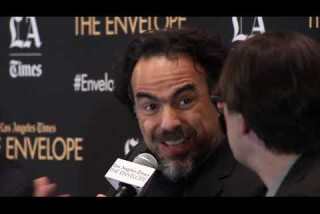Oscars 2016: Victimhood and justice are major themes in this race, which reveal a lot about us
- Share via
At the end of “The Revenant,” the Alejandro G. Iñárritu-directed western poised to win top Oscars on Sunday night, Leonardo DiCaprio’s Hugh Glass character faces off with Tom Hardy’s John Fitzgerald.
Glass has chased Fitzgerald for much of the movie, seeking retribution for the crime of murdering his son, and is set to take his revenge. But Fitzgerald has a philosophical point to make first.
“Well, you enjoy it, Glass? Cause there ain’t nothin’ gonna bring your boy back,” Fitzgerald tells him before being killed.
Full coverage: Oscars 2016 | Nominees list | #OscarsSoWhite controversy
Watch Q&As with the ‘The Revenant’ cast and crew


Video: 'The Revenant': Limited shooting hours

'The Revenant': Attraction of the story

Video: 'The Revenant': Know what you're getting into

'The Revenant': Knowing a character's future

'The Revenant': Conditions affect performance

Video: 'The Revenant': The bear scene

'The Revenant': Agility of the story
It’s hardly a throwaway question. When I asked Iñárritu what he saw as the primary lesson of his film — which encompasses far-reaching issues such as nativism, environmentalism and colonialism — he cited this line, saying that for him the movie was far more about the personal issue of justice. More specifically, what justice does (or doesn’t do) for us.
“Many revenge films suggest the character that has his revenge lives happily ever after,” the director said. “And I don’t know that that’s true. The question for me is what happens after revenge. If gaining justice becomes the meaning of your life, what happens after you accomplish it? What happens if it doesn’t accomplish what you really want it to?”
Ideas of retribution and fairness have rippled through this year’s Oscar race. This has been the season of the victim, on- and off-screen. Americans are aggrieved and agitated. They have been wronged by evildoers, let down by the institutions built to protect them. And they have sought justice within — or, frequently, outside — the system.
In Tom McCarthy’s “Spotlight,” another Oscar front-runner, young churchgoers are sexually abused by priests, then watch as a cowardly city turns its back on them.
Lenny Abrahamson’s “Room” features a young woman, Joy, whose generosity is exploited by a sadistic kidnapper, then is abandoned to a life of captivity when authorities can’t locate her. In fellow best-picture nominee “The Big Short,” directed by Adam McKay, all of working America is the victim, attacked by a predatory system as a watchdog government provides no safeguard.
Watch Q&As with ‘Room’s’ Brie Larson


'Room:' When Brie Larson read the novel for the first time

'Room:' Tapping into dark moments with Lenny Abrahamson

'Room:' Breaking down the film's reunion scene

'Room:' Learning from real life victims

'Room:' How everything in the film tells a story
The victims are left to turn elsewhere for help, or to their own devices. The men of “Spotlight” find saviors in workaday journalists. The heroine of “Room” takes matters into her own hands and engineers an escape, just as the hero of “Revenant” must crawl his way to frontier justice.
Those harmed in “The Big Short,” on the other hand, have little recourse. The few who anticipated their plight are capable only of enriching themselves.
Even when allies exist, they can do just so much. The journalists of “Spotlight” can’t offer money, let alone restore a childhood; at best, victims receive the satisfaction of knowing the perpetrators have been brought to light.
The market crash in “Big Short” does not, the film notes with wicked sarcasm, even result in arrests, never mind restitution.
Meanwhile, Joy watches as her captor is apprehended and prosecuted. But it occurs casually and largely off-screen, and does little to heal her. Glass’ act of murder of course does not bring back his dead son.
SIGN UP for the free Indie Focus movies newsletter >>
To audiences who’ve been watching these films, this all might seem unsatisfying. Movies about injustice are supposed to seek some kind of cure; otherwise what’s been the point of the whole enterprise?
Yet equity can operate on another level. Most obviously, it’s meant to restore what’s been lost. Something was taken away; it now must be given back. More complex is the notion of vindication--the idea of someone being forced to acknowledge, verbally or otherwise, they have done wrong. Fairness can be enacted even absent practical effect.
“A lot of people focus on justice as returning what was taken, and if it doesn’t then is it really worth it?” said Thane Rosenbaum, a law professor at New York University and the author of “Payback,” a philosophical examination of justice and revenge. “But there’s a logic behind revenge that defies the rational-actor model. You won’t get back what you lost. But that doesn’t matter. Revenge has its own logic,” he added. “Because humans find a simple lack of justice morally unbearable.”
In this sense, many of these movies (“Room,” in which the heroine turns inward after she is victimized, may be the sole exception) works by a principle Immanuel Kant laid out in his “The Metaphysics of Morals.” According to Kant, if one of the last two men on Earth was a murderer, it would still require the other man to punish him with death, despite no obvious personal or societal benefit. Unless one of these last man on earth was Will Forte, in which case all bets are off. (Including Kant and Will Forte in the same paragraph, incidentally, is both a moral and metaphysical violation.)
The issue of justice has this year of course arisen not just with Academy Award movies but with the Academy Awards themselves. As the #OscarsSoWhite movement has gained momentum, activists have sought to correct a fundamental inequity. How, among so many movies produced over the course of a year, could one of the 20 best performances not come from a person of color, they asked when acting nominations were announced.
Controversy has since raged, prompting protests and boycotts as well as a backlash, evidence of which could be found in many places over the past six weeks, including my inbox. And though some of those objecting to the movement aren’t exactly temperate, others make a reasonable point. Essentially they ask if this is enough. Will correcting an Oscar oversight make up for a century of Hollywood discrimination?
And, more broadly, would fixing a system of Hollywood discrimination make up for centuries of American racism?
Yet symbols are important. Vindication can take abstract forms. To ask whether shuffling around Oscar voters would redress social ills is to pose the wrong question. Ensuring that one or two black actors are nominated for a movie award of course won’t fix racism. But racism won’t be fixed without such gestures either.
This notion -- justice via symbolic effort -- has crept into other corners of pop culture. Sitting in the Pennsylvania courtroom recently as a judge weighed whether prosecution of Bill Cosby could move ahead, I found myself wondering whether a trial of one woman, involved in just one alleged incident, would really make a difference. It seemed like cold comfort to the dozens of alleged victims who couldn’t have their stories told in court, who couldn’t face their accuser, who couldn’t, because of the statute of limitations, see their alleged attacker brought to justice.
But victims see this differently.
“This was the first time Bill Cosby has faced criminal charges,” Angela Rose, the executive director of the victims’ group PAVE, said after the ruling was handed down. “It is a small yet substantial victory for his accusers.” Even if their alleged tormentor is never called out for acts done to them, in other words, there is vindication in seeing another woman have her day in court. Justice by proxy is still justice.
Victimhood is often viewed as an easy cinematic device, a way to instill instant sympathy in the audience (and, in the case of more activist sufferers, to spring them on a quest). Such movies also, as the inbox-backlashers eagerly note, help pull us into the quicksand of our collective self-pity. They’re more evidence of a nation with a whine problem.
Yet even the most hardened observers would find it difficult to argue that much of this disenfranchisement isn’t real. The societal benefits to airing the problem is equally real — sometimes for the people on whom the story is based (see how the survivors of abuse have used “Spotlight” as a vehicle for spontaneous group therapy, as my colleague Amy Kaufman wrote last week), sometimes on behalf of a larger good.
Personal justice is a slippery matter. The line between going outside the system and vigilantism is thin. But these yearnings are both timeless and timely, especially in this moment of populist anger. Primary-election votes for a candidate or attendance at a rally often won’t lead to the change we like. We may even know it won’t lead to the change we like. Yet we vote or attend the rally anyway, out of a sense that by simply being part of the quest for justice we have achieved a measure of it.
“When you’re living in a world surrounded by institutional failure,” Rosenbaum said, “when the police aren’t doing what they’re supposed to do, when courts aren’t doing what they’re supposed to do, when companies aren’t doing what they’re supposed to do, when regulatory agencies aren’t doing what they’re supposed to do, populist candidates become very appealing, and revenge films become very appealing. At least there’s order to the moral universe in a revenge film.”
Glass’ son will never come back, no matter how many snowy landscapes he crawls across or how many horse carcasses he turns into his private Motel 6. But as we’ve seen time and again this Oscar season, the pursuit itself is important, for both the men and women on screen and, perhaps, those in the audience watching them.
MORE:
The Meryl Streep method of attracting Oscar nominations
Quiz: How much do you know about Academy Awards history?
‘Room’ star Brie Larson grapples with newfound fame, surreal moments and a certain giant ape
More to Read
Only good movies
Get the Indie Focus newsletter, Mark Olsen's weekly guide to the world of cinema.
You may occasionally receive promotional content from the Los Angeles Times.








